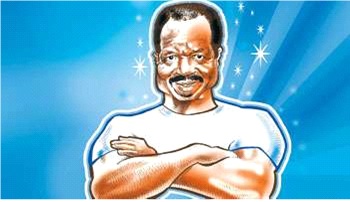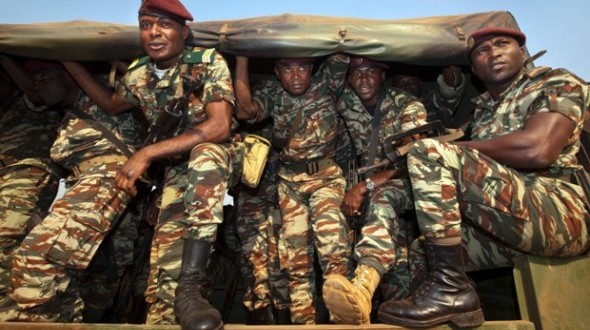The Situation in Southern Cameroon: A Call for a Halt to Human Rights Repressions
The ILA (Nigeria) Committee on Justice and Human Rights, acting under the protective mandate of the African Charter on Human and Peoples’ Rights, is concerned over the ongoing events in the Republic of Cameroon and has considered it imperative to add its voice to the variously expressed opposition to the wanton violation of the rights of the people of English speaking Provinces of Cameroon by the Government of the Republic of Cameroon.
The facts upon which the intervention of the Committee is established, as verified by CNN, Amnesty International and the African Bar Association, are as follow:
I. That residents of Cameroon’s two English-speaking provinces have longstanding grievances against the largely-francophone central government, complaining of economic marginalization and the imposition of French legal and education systems upon them;
II. That in November and December 2016, Anglophone lawyers led protests against the use of French in courts, resulting in clashes with police in which protesters were killed;
III. That the Cameroon Anglophone Civil Society Consortium (CACSC) and Southern Cameroons National Council (SCNC), responded with series of strikes and “Operation Ghost Town” – a form of nonviolent resistance that requiring all supporters to stay at home;
IV. That following the strikes, schools and courts in the Anglophone regions of Cameroon have been shut since November 2016;
V. That on January 17, the government banned the CACSC and the SCNC, holding them responsible for the protests. The CACSC President Nkongho Felix Agbor-Balla and Secretary General Dr. Fontem Neba were arrested on charges relating to terrorism, and are yet to regain their freedom and have not been offered all the necessary facilities for fair and impartial trial.
Being aware that the issues leading to the current impasse are not new, the Committee takes cognisance of the following:
(a) that the current situation is intimately linked to the events that occurred in British Southern Cameroon in the context of decolonisation having its root in the League of Nations Mandate System that partitioned Cameroon between Great Britain and France and which culminated in the plebiscite of the United Nations on Southern and Northern Cameroon independence question;
(b) That matters arising from the plebiscite have been a subject of litigation and discussion at several international forums, particularly, at the International Court of Justice (ICJ) and the African Commission on Human and Peoples;
(c) That the Committee is aware that the facts presented to the African Commission on Human and Peoples Rights on the Southern Cameroon (‘Ambazonia’) in the case of Gorji-Dinka v Cameroon (2005) AHRLR 18 (HRC 2005), particularly, paragraphs 2.1 to 3.2, were unchallenged by the government of Cameroon;
(d) The Committee also takes cognisance of Kevin Mgwanga Gunme et al v Cameroon (communication 266/03) in which, after it had painstakingly considered the position of both parties, the African Commission made the following findings:
· On the facts presented that Cameroon’s law enforcement officers were employing torture, amputations and denial of medical treatment to suppress the Southern Cameroon question, against the claim of government of Cameroon that the agitators had perpetrated terrorist acts in the country, the Commission found Cameroon liable, emphasising that the methods employed by Cameroon were unjustified;
· On the imposition of French on the Anglophone regions, the Commission found that it was wrong for institutions, such as banks to force Southern Cameroon based companies to change their basic documents into French in violation of Article 2 of the African Charter;
· On the failure of Cameroon to guarantee fair trial to the Anglophone activists, the Commission found Cameroon in violation, for:
– transferring individuals from Southern Cameroon to Francophone Cameroon for trial by military tribunals,
– denying interpreters to those tried in civil law courts;
· The Commission found (concerning the individuals that were tried in French without the help of interpreters) that, having denied them the opportunity to adequately prepare their defence, Cameroon violated articles 7.1.b, 7.1.c and 7.1.d of the Charter.
· The Commission was categorical in finding that the tendency of military tribunals is to act as an extension of the executive, rather than the judiciary, and that they are not intended to try civilians but to try military personnel under laws and regulations which govern the military. The Commission finds that trying civilians by the Yaoundé and the Bafoussam Military Tribunals was a violation of the right to fair hearing;
· The facts before the Commission showed cases of suppression of demonstrations with excessive force as well as the unlawful arrest and detention of protesters, peaceably exercising their right to freedom of assembly. The Commission found that some of the detained persons were acquitted while some died at the hands of security forces or in detention. The Commission found Cameroon in violation of article 11 of the African Charter.
· The Commission also condemned the relocation of business enterprises and location of economic projects to Francophone Cameroon, which generated negative effects on the economic life of Southern Cameroon as a violation of article 19 of the Charter.
(e) Having carefully considered the similarities of behaviour of the government of Cameroon that gave rise to the aforementioned cases to those now being employed by the government (and which show that Cameroon failed to implement the recommendations of the Commission), it is the view of this Committee that for their currency and relevance to the presence situation, fitting to adopt and reiterate the recommendations and to strongly urge the Cameroonian government to take all necessary steps to implement the findings as an important step towards the resolution of the historic Southern Cameroon question.
(f) Accordingly, we call on the government of Cameroon to, among others:
· release forthwith all those who are currently detained or are being tried for and in respect of matters arising from the southern Cameroon question;
· commence a process of national dialogue and payment of compensation to all individuals whose rights have been violated by the unwarranted use of force by the government of Cameroon against the people of Anglophone regions of Cameroon.
· address the grievances expressed by the English speaking Provinces of Cameroon through its democratic institutions. The 1993 Buea and 1994 Bamenda Anglophone conferences raised constitutional and human rights issues which have been a matter of concern to a sizable section of the Anglophone Regions of Cameroon for quite a long time;
· immediately begin sincere, inclusive and purposive process of consultations towards the amendment of 1995 Constitution of the Republic of Cameroon to address the demands of the Anglophone Regions of Cameroon, particularly since it did not accommodate the concerns expressed through the 1993 Buea Declaration and 1994 Bamenda Proclamation;
abolish all discriminatory practices against people of Southern Cameroon, including equal usage of the English language in business transactions;
stop the transfer of accused persons from the Anglophone provinces for trial in the Francophone provinces;
ensure that every person facing criminal charges be tried under the language he/she understands;
locate national projects, equitably throughout the country in accordance with economic viability as well as regional balance;
enter into constructive dialogue with the Anglophone Regions of Cameroon, and in particular, CACSC and the SCNC, to resolve the constitutional issues, as well as grievances which could threaten national unity; and
to carry out judicial reform towards guaranteeing the independence and impartiality of the judiciary.That the Southern Cameroonians’ should cooperate with sincere and meaningful attempts by the government to resolve their grievances by constitutional means.
Dr Amos O Enabulele,
Chairman
ILA (Nig) Committee on Justice & Human Rights






7 comments
It is all spoken even though one point wsa left out; complete liberation of the Ambazonians to regain their independence.
So many organizations have spoken about the Cameroon issues but Biya is steal killing southern Cameroonians. I want to beg the Nigeria government to to help take total control of this situation by sending threatening messages to Paul biya and also give a a deadline to allow southern Cameroonians get their independence, and if biya still sturbon, he can match his words with action.
A MONKEY EILL ALWAYS EAT A BANANA,WE AL KNOWS THAT.WHEN ANY
PEOPLE MAKES THEMSELVES A BANANA THE MONKEY WILL EAT. I JUST READ THIS
STATEMENT COMING FROM NIGERIA.ITS FULL OF LIES AND DISINFORMATION THAT.REQUIRE CLEAR EVIDENCE TO BE CONSIDERED TRUE. FOR EXAMPLE.IN 1961 ONE YEAR AFTER FRENCH CAMEROUN GOT ITS INDEPENDENCE DECLARATION BY THE SAME UN.SOUTHERN CAMEROONS GOT HERS BY A 62 TO 23 VOTES.THE EVIDENCE IS ONLINE ON MY FB FRONT PAGE. NO WHERE IS WRITTEN THAT SOUTHERN CAMEROONS NEEDED A PLEBISCITE FOR
IT TO GET INDEPENDENCE. IF THAT WAS THE CASE,WHY THEN DID THE SAME UN AWARDED SOUTHERN CAMEROONS INDEPENDENCE? THE ANSWER IS UN NEVER SAID THAT,THIS LIE CAME FROM VERY CURRUPT TRIBAL AFRICANS FROM
ONE MR JOHN NGU FONCHA. WHOSE ANCESTORS CAME FROM FRENCH CAMEROUN TOWN OD DSCHANG. AND WHO WITH OTHER CAMEROUNESE IMMIGRANTS. DREAM OF MAKING SOUTHERN CAMEROON A PART OF FRENCH CAMEROUN AND RULING IT AS THEIR PROVINCE.COUPLE WITH ONE DICTATATOR FILANI HERDS MAN WHO BECAME PRESIDENT OF FRENCH CAMEROUN AT THAT TIME,CALLED AMADU
AHIJO.THEY ALONE CONCOCTED THIS ILLEGAL FRAUDULENT SCHEME. AND IT WORKED FOR THEM.NOTING THAT SOUTHERN CAMEROONS IN 1961 JUST AS TODAY HAD NO ARMY OR MILITARY TO DEFEND IT.
SOO, THE SOLUTION NOW IS RO EMPOWER SOUTHERN CAMEROONS WITH A STRONG MILITARY TO FORCE MR PAUL BIYA TO WITHDRAW ITS MILITARY FROM SOUTHERN CAMEROONS.SOO 12M AFRICANS CAN AGAIM GOVERN THEMSELVES IN PEACE. ANY OTHER TALK
OF ANYTHING IS JUST A WASTE OF TIME.THE SOLUTION IS DE OCCUPATION.PURE AND SIMPLE.
I haven’t herd anything like Coplete independene
WE WANT INDEPENDENCE. THEN ALL THIS NONSENSE STOPS.
I agree with Mr. Duke. Nothing short of total independence. All that constitution talk was us bending over backward to make the best out of a bad situation when a lot of us were not fully aware of our actual history. Thanks to Mola Njoh Litumbe and others like Lawyer Bobga Mbuton, we are better informed today. Full independence of death.
The emperor has no new clothes, just as the old ones he had are completely and totally fake!!!! All that we, the people of Southern Cameroons want right now is the restoration of our independence and national sovereignty and parting company from the hell hole of la Republique du Cameroun. What don’t people understand about this? Anything short of this will be completely and totally unacceptable and the struggle will continue.